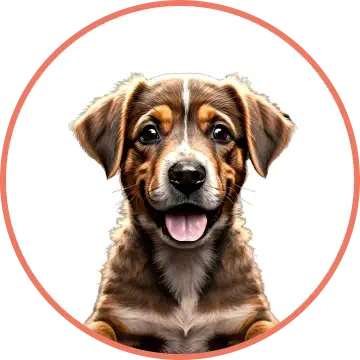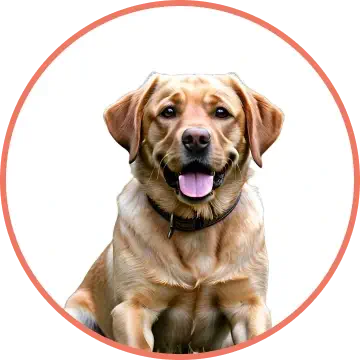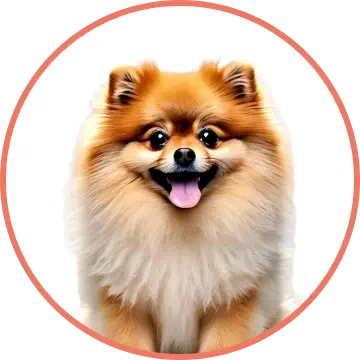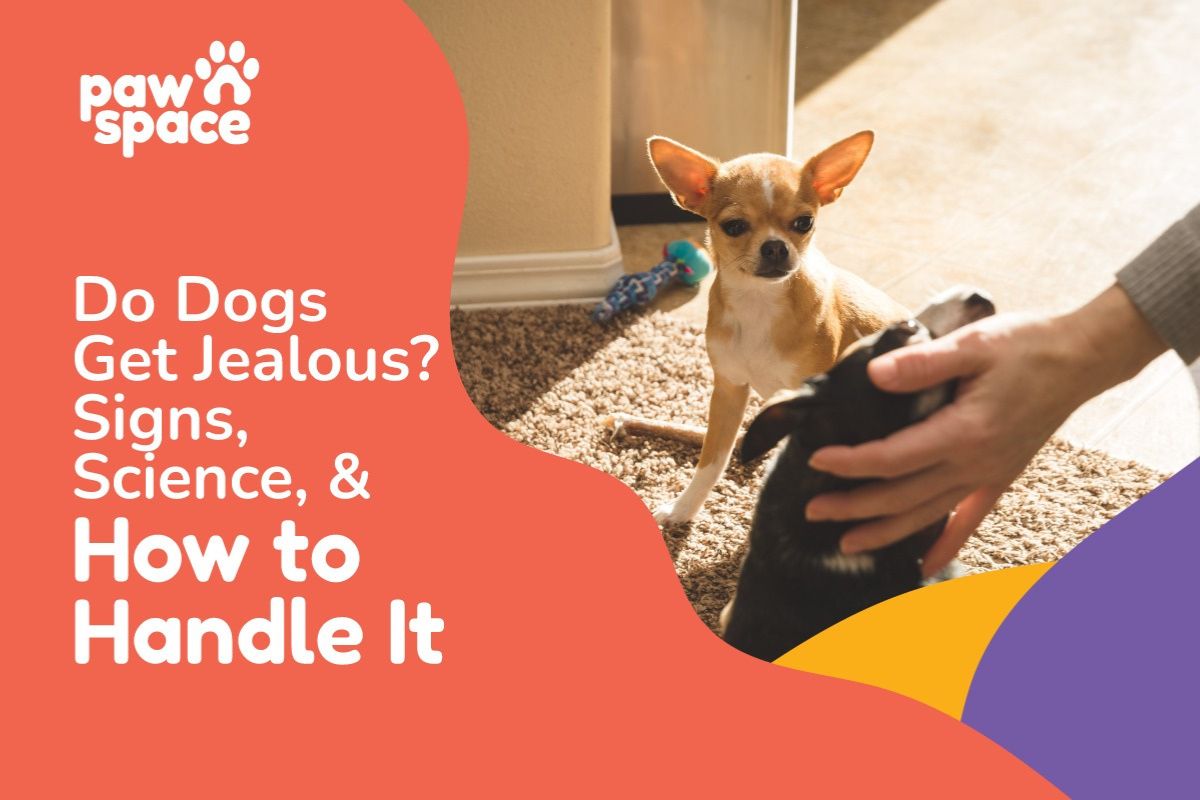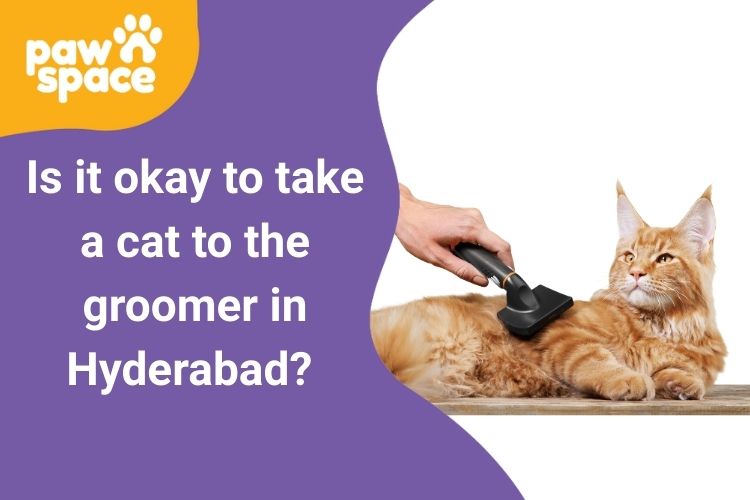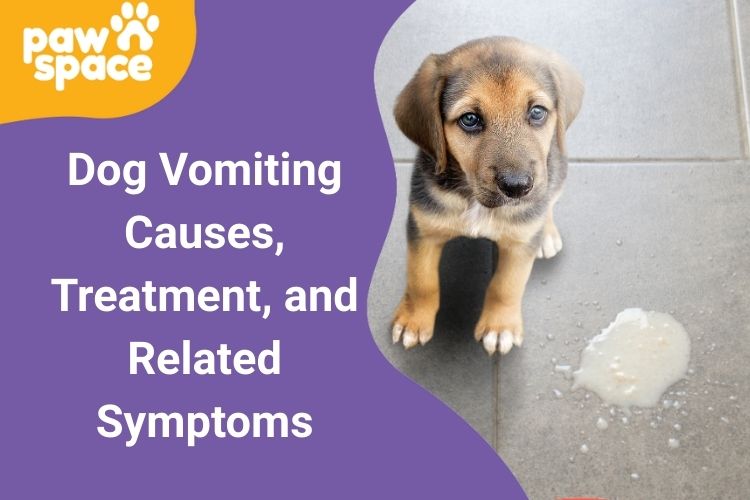If you’ve ever seen your dog shoot you the side-eye while you’re petting another pet or noticed them wedging themselves between you and another person, you may find yourself asking, Do dogs get jealous? The short answer is yes, dogs do display behaviors that are reminiscent of human jealousy. Come, let’s discuss the signs of jealousy in dogs, the science behind it, and how to deal with it to have a harmonious relationship with your dog.
Table of Contents
Toggle- Our Recent Web Stories
- Signs of Jealousy in Dogs
- 1. Attention-Seeking Behavior
- 2. Interrupting Interactions
- 3. Aggressive or Destructive Behaviour
- 4. Excessive Clinginess
- 5. Changes in Eating or Bathroom Habits
- The Science Behind Canine Jealousy
- How to Handle Jealousy in Dogs
- 1. Provide Equal Attention
- 2. Positive Reinforcement
- 3. Create Boundaries
- 4. Resolve Underlying Issues
- 5. Socialisation and Training
- Pawspace: The safe space for your pets
- Why Choose Pawspace?
- FAQs Related to Do Dogs Get Jealous
- 1. How can I know whether my dog is jealous?
- 2. Can jealousy result in behavioural issues in dogs?
- 3. Is jealousy prevalent in all dog breeds?
- 4. How do I avoid jealousy among my pets?
- 5. Should I seek professional help if my dog’s jealousy is extreme?
Our Recent Web Stories
[web_stories title=”false” excerpt=”false” author=”false” date=”false” archive_link=”true” archive_link_label=”” circle_size=”150″ sharp_corners=”false” image_alignment=”left” number_of_columns=”1″ number_of_stories=”3″ order=”DESC” orderby=”post_title” view=”circles” /]
Signs of Jealousy in Dogs
1. Attention-Seeking Behavior
Your dog will begin to push your hand, bark, or whine when you are paying attention to another person or pet. This is their way of saying, “Hey, don’t forget about me!” Dogs love social interaction, and when they feel isolated, they will do all they can to get the spotlight back.
Attention-seeking behaviour can also include bringing toys to you, sitting on your lap, or even pawing at you. These actions are your dog’s way of ensuring they remain your number one priority.
2. Interrupting Interactions
Did you ever catch your dog wedging themselves between you and another person or dog? This old trick is a definite indicator of jealousy. They’re attempting to win back your attention and ensure they’re your priority. This action is usually followed by your dog pushing the other pet or person away, or attempting to jump onto your lap.
Interrupting interactions can also be subtle, like your dog getting in between you and the person you’re talking to whenever you’re interacting with someone else. It’s their “Don’t forget about me; I’m here too!” message.
3. Aggressive or Destructive Behaviour
Other dogs can show aggression to the perceived competitor, either another dog or even an object. They can also show destructive behaviour such as chewing furniture or destroying toys in frustration. Such behaviour can be a means by which your dog can vent their feelings of jealousy and deal with their perceived loss of attention.
Aggressive behaviour can range from growling and snapping to more severe actions like biting. If your dog shows signs of aggression, it’s important to address the issue promptly to prevent it from escalating.
4. Excessive Clinginess
If your dog all of a sudden gets too attached and is glued to your side everywhere you go, it may indicate jealousy. They don’t want to miss any of your attention. This type of behaviour will be especially pronounced if your dog was not an overly clingy dog and now has begun trailing your every step.
Excessive clinginess can also manifest in your dog seeking constant physical contact, such as sitting on your lap, lying at your feet, or even sleeping in your bed. While it can be endearing, it’s important to ensure this behaviour doesn’t stem from insecurity or anxiety.
5. Changes in Eating or Bathroom Habits
Jealousy may trigger stress in dogs, which can be reflected in eating or elimination behaviour. They could eat less, have accidents at home, or even get diarrhoea. Stress-associated changes in behaviour can be an unmistakable signal that your dog is jealous or neglected.
Eating habits can change in your dog by not wanting to eat their meals, eating faster than normal, or being finicky with their food. Bathroom habits can change as well, by having accidents in the house, having a change in the frequency of bathroom breaks, or acting unusually during bathroom time.
The Science Behind Canine Jealousy
Scientists have investigated canine jealousy to determine whether dogs feel emotions like those of human beings. Researchers have also discovered that dogs do have jealous reactions, but only when their owners are showing affection to another dog. The researchers had owners play with a life-sized stuffed dog that barked and wagged its tail while recording their own real dogs’ reactions.
The findings showed that the dogs attempted to push or touch their owner and the fake dog, indicating behaviours that mirrored jealousy. According to the scientists, the researchers concluded that jealousy was not exclusive to humans because dogs could express jealousy as a means of competing for resources and social relationships.
How to Handle Jealousy in Dogs
Now that we know dogs do become jealous, it’s critical to address jealousy so that you can have a healthy and happy relationship with your dog. Below are some tips on how to deal with jealousy in dogs:
1. Provide Equal Attention
Ensure all your pets are given equal care and love. Spend quality time with each pet separately so that they feel loved and appreciated.
2. Positive Reinforcement
Reward your dog for good behaviour, especially when they remain calm and relaxed while you’re interacting with others.
3. Create Boundaries
Set boundaries to avoid jealousy. Repeated training and reward will make your dog realize their boundaries and eliminate jealousy.
4. Resolve Underlying Issues
At other times, jealousy can be a manifestation of underlying conditions such as anxiety or insecurity. Speak to a veterinarian or professional dog trainer about resolving any emotional or behavioural issues.
5. Socialisation and Training
Make sure your dog is properly socialised and trained. Socialization makes your dog more relaxed and confident in a wide range of situations, lowering the chances of jealous behaviour.
Training may involve fundamental obedience commands such as “sit,” “stay,” and “leave it,” which may assist you in controlling the behaviour of your dog during times when jealousy may occur. Regular training and reward can aid your dog in learning good habits and minimising jealousy feelings.
Pawspace: The safe space for your pets
We at Pawspace are dedicated to providing top-notch care and companionship for your beloved pets. Honoured to be India’s biggest pet-centred community! Created and curated by pet parents.
Our services include pet grooming, pet boarding, pet sitting, doorstep dog training, dog walking, pet taxi/cab, pet relocation, pet funeral, cat grooming, etc.
Why Choose Pawspace?
- Available on demand for pet parents everywhere
- Verified caregivers with a 5-point checklist & rigorous background checks
- Be at peace by receiving regular updates through chats, photos and videos
Dogs, just like humans, get jealous and can show signs of feeling left out. Providing a healthy and loving home for all of your pets is critical to their happiness. Understanding the signs of jealousy and addressing them will mean that your dog will feel loved, appreciated, and safe.
Also, check the frequent updates on our Pawspace Instagram page
FAQs Related to Do Dogs Get Jealous
1. How can I know whether my dog is jealous?
Look for attention-seeking behaviour, interrupting interactions, aggression, clinginess, and changes in eating or bathroom behaviour.
2. Can jealousy result in behavioural issues in dogs?
Yes, jealousy is known to cause behavioural issues like aggression, destructiveness, and overclinginess. Early intervention for jealousy can prevent these issues.
3. Is jealousy prevalent in all dog breeds?
Jealousy is present in any dog breed, but the intensity and expression of jealousy will differ depending on the personality and experiences of the individual dog.
4. How do I avoid jealousy among my pets?
Give equal attention to all the pets, praise good behaviour with positive reinforcement, and set limits to avoid jealousy-driven behaviours. Socialisation and training are also important.
5. Should I seek professional help if my dog’s jealousy is extreme?
If your dog’s jealousy manifests as extreme behaviour or you don’t know how to handle it, seek help from a veterinarian or a professional dog trainer.





